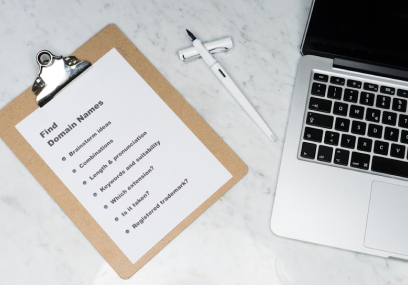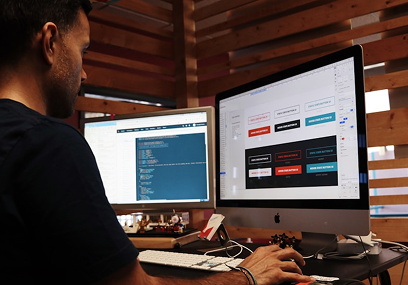.inc domains Flash Sale! Use INC50 at checkout.
How to Protect Your Startup Before Launch

Launching a startup is thrilling, but it’s also risky. While you're heads-down building, someone else could be locking in the name you just pitched to investors.
Protecting your business name before launch is one of the smartest (and easiest) moves a founder can make. From domain squatters to social impersonators, the risk is real.
This guide walks you through how to protect your company name, brand, and digital identity before it’s too late.
1. Lock Down Your Domain Name Fast
One of the fastest ways to lose your brand is failing to secure a business name online. Your domain name is your startup’s address, and once it’s taken, you’ll either have to pay a premium or rebrand.
The fix? With the .inc Reserve feature, you can now lock in your domain name early, even if you’re not ready to launch. It’s a low-effort way to make sure your name stays yours, without needing to set up a site or commit to anything big.
It’s perfect for that in-between stage when you're still figuring things out, testing ideas, or lining up funding. No pressure to go live.
2. Secure Your Business Name Legally
Founders often ask, "How do I protect my business name legally?"
Start with a basic name availability search in your state or country using a business registry or a U.S. business name search. This step confirms that your chosen name isn’t already taken or too similar to another brand.
Once you're sure the name is clear:
- Register your LLC or Corporation under that name.
- Consider filing a “Doing Business As” (DBA) if your legal and brand names differ.
This creates a paper trail and helps build your brand’s legal identity; a big plus if legal disputes ever arise.
3. Secure Your Name on Social Media Platforms
Social media is where people first look you up. That means securing a business name across social channels is key to building trust.
Even if you're not active on every platform, secure your handles on Instagram, X, LinkedIn, TikTok, and Facebook. Tools like Namechk or Social Searcher let you check hundreds of platforms at once.
This step also prevents brand impersonation, a growing issue for new startups.
4. Protect Your IP with Trademarks
How do you protect a company name beyond just the domain and social handles? The answer: trademarks and copyrights.
Here’s what matters:
- You can’t “copyright a business name” (copyrights apply to original content like logos, websites, etc.)
- You can trademark a business name, product name, or logo through the USPTO
- While this isn’t essential at the idea stage, trademarking protects your name legally at scale.
If you’re wondering how to copyright a name and logo, the correct process is applying for a trademark, not copyright.
5. Keep It Confidential Until It’s Secured
Many founders make the mistake of pitching or posting their business name before they’ve secured it. That’s how great names get poached.
Use NDAs when sharing your idea, and keep your brand name under wraps until your domain, social handles, and legal entity are reserved.
Even if you’re operating stealth, take steps to protect your business name early so you don’t get burned later.
6. Monitor and Defend Your Brand
Protection doesn’t stop after registration. Ongoing monitoring is essential to ensure your business name isn’t being misused.
Here’s how to protect your brand post-launch:
- Set up Google Alerts for your business name.
- Monitor domain registries and social platforms for similar names.
- Act fast on impersonation, fake pages, or domain squatters.
If you see a name conflict or copycat, consult a brand lawyer or submit a takedown via domain or social platforms.
Why Early Name Protection Matters
Whether you're wondering how to protect your business name or how to secure a company name, the answer is the same. Be early. Be proactive.
Delaying can mean:
- Losing your ideal domain (and paying thousands to buy it back)
- Facing legal disputes over your brand name
- Being impersonated online
- Having to rebrand completely
Even big name businesses started by locking down the basics. Early protection isn't overkill, it's just good strategy.
Final Thoughts
Your business name is more than just a label. It’s your identity, your trust signal, and your first impression. Once it’s gone, getting it back is expensive, time-consuming, or impossible.
If you’re asking, “How do I protect my business name before launch?” this is your answer:
Start with the easiest win: Reserve your domain now for $4/month.
No pressure, no big spend. Just peace of mind that your brand is protected while you build.
Protect your startup before launch by securing your ideas, brand, and structure. Visit My.Inc for a complete founder’s guide.
Frequently Asked Questions
Q: How do I protect my business name legally?
A: To legally protect your business name, the most effective method is to register it as a trademark. This provides you with exclusive rights to use the name and prevents others from using similar names that could cause confusion. You should also consider registering your business name as a domain name and potentially as a DBA (Doing Business As) if you are operating under a name different from your legal business entity.
Q: Can I reserve a domain name without a company?
A: Yes. Services like .inc Reserve allow you to secure a domain name before registering your business.
Q: How do I copyright a business name?
A: You can't copyright a business name. Copyright protects original works of authorship, like books, music, and software, not names or titles. To protect a business name, you need to trademark it. Trademarking a name gives you exclusive rights to use that name for your goods or services and prevents others from using a similar name that could cause confusion.
Q: What’s the best way to protect your brand online?
A: Secure your domain, register your business, claim social handles, and monitor for impersonators.
Q: What defines a startup and how does it differ from a traditional business?
A: A startup is a newly formed company or project focused on developing and validating a scalable business model, often utilizing technology and innovation to disrupt existing markets. Startups are characterized by their initial high costs, limited revenue, and reliance on external funding to grow. They aim for rapid growth and scalability, often with the goal of eventually being acquired by a larger company or going public.
Q: What is a domain name and how does it work?
A: A domain name is a human-friendly identifier for a website or other online service, acting as an easy-to-remember address that replaces a complex IP address. It's the address you type into a browser to reach a website (e.g., google.com). Domain names consist of a top-level domain (TLD) (like .com, .org, or .net) and a second-level domain, and can also include subdomains.


.png)